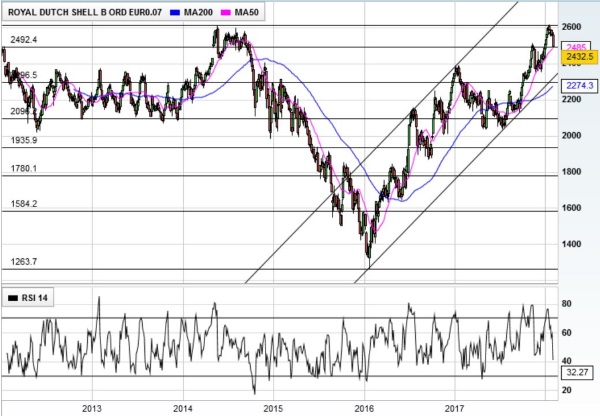Shell still good value despite results miss
1st February 2018 12:29
by Graeme Evans from interactive investor
Share on
These are heady times for and its rivals, with some big oil analysts thinking that 2018 could be the industry's best year in decades.
Q4 figures from Shell certainly gave investors a taste of what might follow this year, although there will be bumps in the road judging by today's disappointing figures in downstream and on cash flow. Shares fell by 2% at one point, having been at a record in recent days after rising 12% over the last year.
The mixed performance in the fourth quarter reflected a strong result for upstream operations, where higher oil prices and a 1% rise in underlying production helped profits reach $1.65 billion (£1.1 billion) in the period. This was much better than the $1.1 billion forecast by analysts.
But downstream profits represented a big miss, with the figure of $1.4 billion some 34% short of consensus expectations after weaker performances in oil products and chemicals.
Shell still posted overall underlying profits of $4.3 billion for the quarter, leading to the 2017 result more than doubling on 2016 to nearly $16 billion.
Cash flow from operations of $7.28 billion was 27% lower than UBS's estimate, with the difference mainly due to a $1.6 billion tax payment related to disposals.
Despite disappointing elements in today's results, UBS continues to back the Anglo-Dutch company with a 'buy' rating and price target of 2,675p.
Its valuation is based on a potential 2019 dividend yield of 5.3% and a 2019 free cash flow yield (at a forecast oil price of $65 a barrel) of 9.1%. Today's dividend was maintained at $0.47 a share, which was expected.

UBS believes that Shell and its rivals are now in the "sweet spot" for shareholder value generation, having been through the pain of resetting their financial models in order to deal with lower oil prices.
Now that the Brent crude price is well above the point of cash neutrality for oil majors, UBS expects free cash flow will be used to cut debt, reduce equity in issuance and perhaps indulge in some tactical M&A. It estimates that cash returned to shareholders across the industry could rise by 48% In 2018.
As one of its two top picks in the sector, UBS clearly thinks that Shell will be at the forefront of these trends as the company reaps the rewards from its acquisition of BG. The deal attracted plenty of criticism when it was announced in 2015, but is proving the catalyst for the wider restructuring of the group.
Capital investment has reduced as the company reorganises, with the full-year figure of $24 billion below guidance for $25 billion. Net debt also came down by some $8 billion to around $65 billion, but this was still higher than forecast.
Chief executive Ben van Beurden said 2017 had been a year of transformation, with the company showing it has what it takes to "deliver a world-class investment case".
He added: "We enter 2018 with continued discipline and confidence, committed to the delivery of strong returns and cash."
This article is for information and discussion purposes only and does not form a recommendation to invest or otherwise. The value of an investment may fall. The investments referred to in this article may not be suitable for all investors, and if in doubt, an investor should seek advice from a qualified investment adviser.